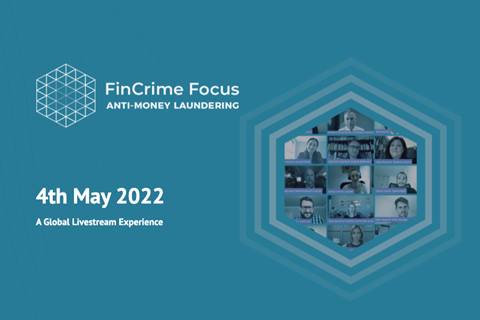We are delighted to announce that financial crime compliance specialist, Sujata Dasgupta will be speaking at FinCrime: Anti-Money Laundering this week.

Sujata Dasgupta is the Global Head (Financial Crimes Compliance Advisory) at Tata Consultancy. She will be sharing the spotlight with fellow panellists at FinCrime: Anti-Money Laundering to discuss the measures organisations must put in place to build effective AML/KYC compliance programmes.
The session dovetails with seven other exclusive panel talks and presentations dedicated to exploring the complexities of AML compliance on the world’s rapidly evolving financial crime stage.
Livestreaming on Wednesday May 4, FinCrime: Anti-Money Laundering unites over 20 thought leaders and subject matter experts to bring professionals up to speed on the latest insight and guidance on efficient, compliant strategies to combat money laundering.
We spoke with Sujata to learn more about her career development and to gain insight into how organisational AML/KYC compliance tactics are evolving through 2022.
Could you briefly outline your career pathway so far?
I started my career as a banker 22 years ago, initially in India and then managing Treasury risk and compliance in New York, USA.
My initiation into compliance in NY coincided with the time USA was building path-breaking AML-CFT Regulations post the 9/11 attack, which I had to comply as part of my work. This is what got me deeply interested in AML-CFT, and I have continued my focus in this space ever since.
After some years in the bank, I moved to IT services and eventually into Management and IT consulting, specifically in the KYC-AML area, which over the years has evolved into a more comprehensive financial crime compliance function.
During my journey, I have engaged with premier banks and financial institutions (FIs) across the UK, EU, Asia, and the US, in significant FinCrime compliance transformations around regulatory imperatives, business priorities, process reimagination, RegTech adoption and so on.
I now head the global advisory on financial crime compliance at Tata Consultancy Services, driving regulatory, business and digital transformations in the areas of KYC, Sanctions, AML and Anti-Fraud. I am based in Stockholm, Sweden.
What are the main components of a successful AML/KYC compliance programme in 2022?
A strong AML-KYC program must start with a robust governance framework, with the “Three Lines of Defence” at its centre: AML/KYC Operations, Compliance Office, and Internal Audit with clearly defined roles. Each line of defence has a unique and significant role to play in the overall enterprise compliance programme.
Execution framework comes next, with the right engagement of people-process-technology to execute the internal controls around prevention, detection, investigation and reporting of crimes.
Finally, a continuous review and monitoring framework are essential to monitor emerging risks, policy and controls adherence, and internal audits for independent review. Effectiveness of existing controls and their application must be verified regularly and tuned as necessary to defend against current and emerging fincrimes.
What are the key business benefits of maintaining an effective AML/KYC compliance programme?
Financial institutions are at the forefront of fighting financial crimes – the gatekeepers preventing the entry and movement of dirty money and proceeds of crime across the globe.
Maintaining a strong enterprise-wide KYC-AML compliance programme strengthens their ability to protect the financial system, by understanding financial crime related risk exposures, designing corresponding controls, and effectively preventing and disrupting crimes. It also enables adherence to regulatory compliance, avoid fines and penalties, legal and criminal proceedings, and reputational damage that may arise from deficiencies or non-compliance.
A comprehensive compliance programme is one that takes into account global and local regulations of all jurisdictions the financial institution operates in, thus integrating all applicable laws and creating a strong unified platform for enhanced KYC-AML effectiveness.
What are the primary challenges that organisations face as they bid to improve their AML/KYC compliance?
Traditionally, KYC-AML compliance has remained a fragmented function in organisations across lines of businesses (LoBs), countries and operating units/entities. Building a unified compliance program requires harmonising the functions across these segments with standardised policies, controls, systems and procedures which is not an easy task for large organisations spread across countries with multiple entities and LoBs.
Siloed data and platforms are further challenges that organisations have to deal with. Most of them lack centralised data required for KYC-AML (data of customers, accounts, transactions etc.), as well as disparate systems and tools which are not integrated, leading to huge manual efforts in processing the required controls. Unifying data and platforms for an effective enterprise wide compliance program require huge investments and run into multi-year implementation projects.
The highly dynamic nature, complexity and sophistication of financial crimes constitutes another challenge that organisations have to tackle, while trying to enhance their existing compliance frameworks. New crime typologies, emerging threats of innovative payment channels and products, use of cutting edge technologies are some of the areas that criminals are continuously innovating in and organisations are trying to catch up on.

Don’t miss Sujata Dasgupta speaking exclusively at FinCrime Focus: Anti-Money Laundering in the panel debate: “Key Elements of an Effective Global AML/KYC Compliance Programme in 2022”
Also on the panel
- Devraj Basu, Senior Lecturer in Finance, Accounting and Finance Department, Strathclyde Business School
- Talal Shoukat, Head of Compliance & MLRO in well-reputed money services company
Session time: 13:30-14:20 PM BST
Date: Wednesday 4th May 2022











No comments yet